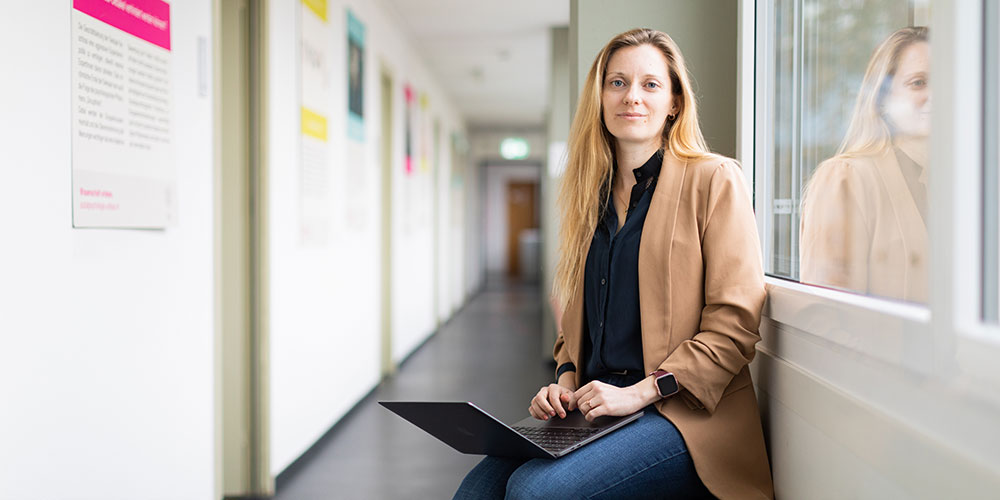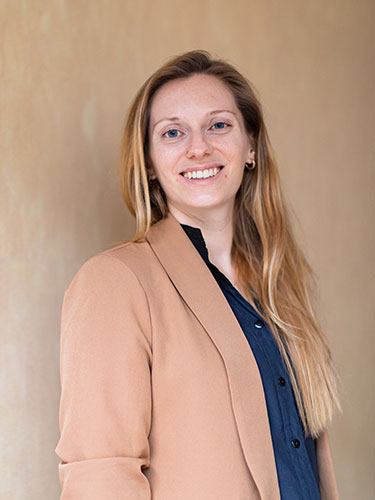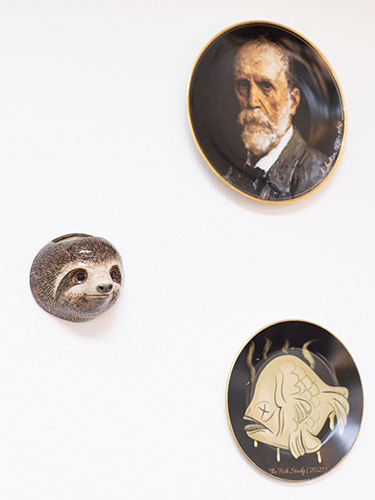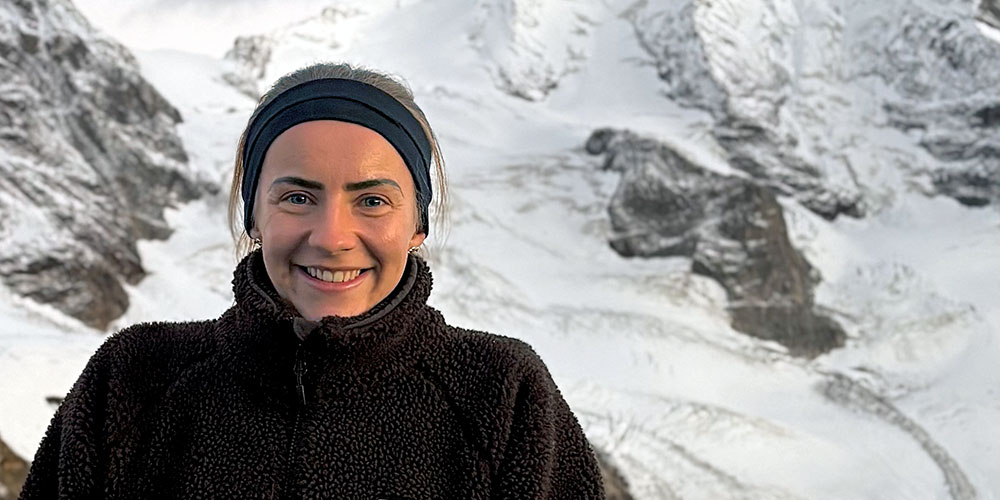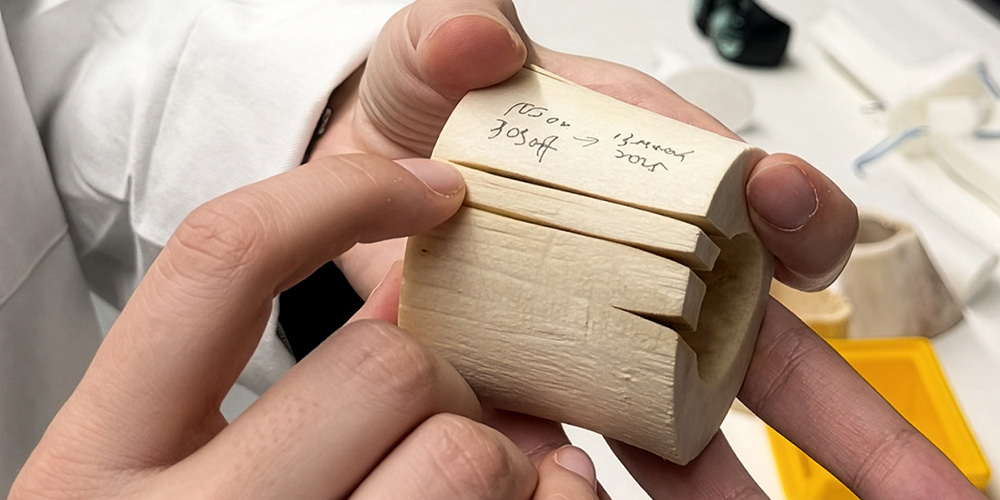Where trust ends: Fanny Lalot explores the consequences of betrayal
Fanny Lalot deceives others. Only within the scope of a study, however. The psychologist wants to find out how trust is built and broken. This is not her only research topic: Lalot seeks to shine a light on all sorts of human behavior.
02 March 2023 | Anika Zielenski
When it came to deciding what to study, Fanny Lalot was spoiled for choice. “I wanted to do everything and it was so hard to choose,” she recalls as she thinks back to her path into psychology. Initially, Lalot – now a postdoc – studied medicine for a semester, but it did not appeal to her in the slightest, so she switched her degree subject. “That’s when I completely fell in love with psychology.”
She particularly enjoyed experimental psychology, and she stuck with her alma mater, too: after her Bachelor and Master studies in Geneva, she went on to do a doctorate in social psychology. “I started as a research assistant in the group. After I graduated, one of the professors offered me the position. It was such a great opportunity,” the 33 year old recalls.
From Geneva to Basel via Kent
After receiving her PhD, Lalot knew she wanted to do a postdoc abroad and applied for a position at the University of Kent. “I’d had my eye on the UK for a while. It’s close enough to hop on a train and go back home and it’s also a country I loved visiting”. In Kent, Lalot primarily worked on a large-scale project on social cohesion during the COVID-19 pandemic. But she always intended to return to Switzerland to be with her family and partner and after two and a half years abroad, she came to the University of Basel in 2021. Here, her six-year postdoc position allows her to do exactly what she likes best: research a wide range of wildly different topics.
A range of research interests
Just like in her undergraduate days, Lalot’s research interests are highly diverse: “I've done many different things. I don't like to be obsessing over just one topic and I'm always happier if I can attach to a lot of different projects.”
Lalot has researched human behavior in contexts such as the environment and climate change, social exclusion on social media, citizens’ trust in politicians during the COVID-19 pandemic, and in general, how past actions can influence the future. “I would call myself a social psychologist with an interest in political and environmental psychology,” she summarizes.
Trust and betrayal
In her latest project, the researcher explores the topic of trust: specifically, the impact of a betrayal on trust. Lalot gained some initial experience of the subject matter in Kent, but with a greater emphasis on trust in politics. Now, her aim is to focus more on the impact of betrayal in interpersonal relationships. In particular, she wants to know: “For example, if person A has been betrayed by, say, a young Italian woman, how does this impact on their trust toward other similar young Italian women?”
To find out, the social psychologist is developing gamified online experiments. The participants primarily play against a computer-generated avatar, which has been programmed by Lalot and her colleagues to simulate a real human. These avatars can either betray the participants or collaborate with them. Over the course of multiple rounds, Lalot measures how betrayal affects the players’ future behavior.
A sloth, a fish and an older gentleman
When you ask Fanny Lalot what she likes best about doing research, she replies with a beaming smile: “Pretty much everything. I had so much fun developing the experiments and games for my trust project. For example, creating the little avatars that play against the participants. I’m also a bit of a nerd when it comes to data analysis. I love looking at statistics and seeing what works and what doesn’t.”
Her expression only darkens a little when the publishing process comes up. She calls her last project “the sloth.” The publication of her study on the impact of trust in the government on compliance with COVID-19 measures in the UK took more than a year, hence the comparison to the rather sluggish animal. To celebrate the final publication of the paper, she put up a little sloth figure on her office wall.
It has pride of place along with two other souvenirs: “This fish here is intentionally a bit disgusting,” she explains as she points out a small, round ceramic plate next to the sloth. “I gave it to my colleague as a memory of a study of hers where the participants had to throw a virtual fish like this one to each other. One person was excluded from the game. We wanted to test whether exclusion hurts, when the activity one is excluded from is completely horrible,” explains Lalot. A picture of an older gentleman completes the slightly odd collection. “We found him in a Brocki and thought that he looked a bit like Sigmund Freud, so we call him the ‘Swiss Freud.’”
The globetrotter
Whenever Fanny Lalot is not busy working on new experiments, analyzing data or decorating her office at the end of the long hallway on the second floor of the Faculty of Psychology, she pursues her second passion: travel.
Chile, Peru, Indonesia, Vietnam: Lalot’s bucket list is long. Her next trip, together with her partner, will be to Japan. “We’ve been there once before and mostly stayed on the main island. We have been wanting to go back for a few years, but it wasn’t possible. This year it is finally happening!”
However, Lalot does not yet know where her research journey will take her after her postdoc in Basel. “I’ve applied for an SNSF grant, but it’ll be a few months before I hear back. If I get it, it’ll give me even more freedom, and I could also supervise a doctoral student. That would be amazing.” She would also like to stay in Basel if possible. “But it’s academia. You never really know where you’ll end up.”

